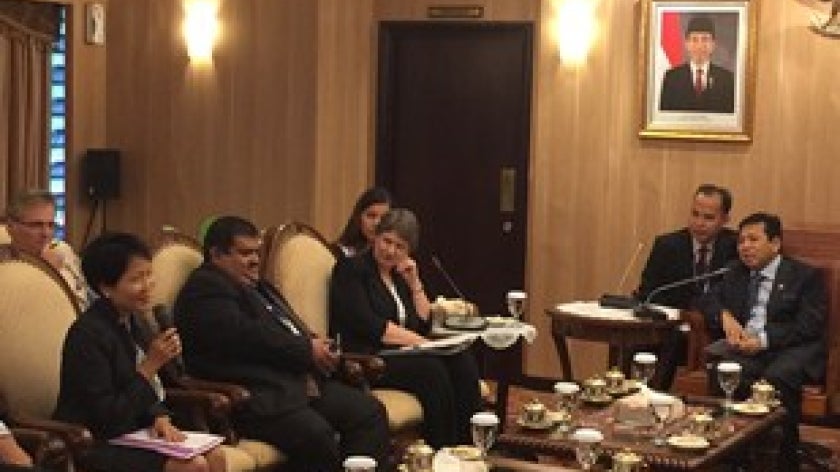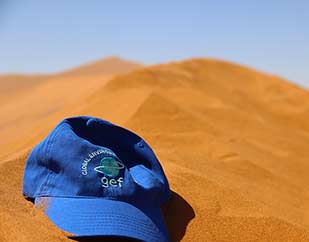
Washington DC, March 2nd, 2015: Achieving the maximum impact of GEF resources requires country ownership and strategically selective programing. Recognizing this, the GEF is putting strong emphasis on engaging a broad range of stakeholders in recipient countries. As the GEF-6 programing cycle is now beginning in earnest, these efforts are being intensified through the roll-out of the GEF Country Support Programme (CSP), including Expanded Constituency Workshops (ECWs), National Dialogues, and other activities. In February alone, country engagements took place in India, Indonesia, and Turkey and with 10 Southern African countries hosted by Namibia. Everywhere the questions discussed were similar: What are countries’ key environmental priorities and how can the GEF support these in a way that maximizes impact?
India: Smart Cities and Solar Energy
When meeting the GEF team led by GEF CEO Naoko Ishii, the Indian Minister of Urban Development, Mr. Naidu, underscored the Government’s expectation for the GEF’s support for the Government’s “100 Smart Cities” initiative. The GEF would align its work on cities in India with the new Integrated Approach Program on Sustainable Cities. A key objective would be to provide city managers with the necessary tools and support that would enable them to strengthen their planning and strategy processes focused on sustainability.
The second Indian government priority is renewable energy, in particular solar energy where the government has stated an ambitious target to achieve 100GW installed capacity by 2022. H.E. Minister of Power, Mr. Piyush Goyal in particular emphasized the need to rapidly scale up the deployment of roof-top solar panels and the importance of finding ways to mobilize the private sector, including financing from private financial institutions. The Minister also noted the opportunity to provide off-grid renewable energy in rural areas as means to improve access to energy while at the same time reducing greenhouse gas emissions.
Wrapping up the India visit, GEF CEO Naoko Ishii noted that “the messages from the Indian government were very clear. The GEF is looking forward to supporting the governments in its efforts to achieve its strong vision for a cleaner and greener India, consistent with the country’s aspirations for economic growth and job creation."
Indonesia: Forests and Oceans
The Indonesia National Dialogue, organized and hosted by the newly-created Ministry of Environment and Forest, brought together about 200 participants from a range of government ministries and agencies, the private sector, universities and CSOs, as well as GEF Agencies.
In opening the Dialogue, Secretary of Environment and Forests Siti Nurbaya emphasized the priorities of the new Indonesian government to ensure sustainable development, conservation of natural capital, and creating opportunities for improving the livelihoods of the local people. Reflecting on a series of bilateral meetings that GEF CEO Naoko Ishii had with the Minister of Environment and Forests, the Minister of Planning and the Coordinating Minister for Fisheries the day before the Dialogue, Naoko Ishii remarked that “President Jokowi’s Government has laid out ambitious plans to strengthen sustainable development in Indonesia. It is clear to me that it an important priority for the new government is to manage Indonesia’s vast natural resources in a way that supports economic development and job creation.”

GEF CEO Naoko Ishii and UNDP Administrator Helen Clark meeting with Indonesian Parliamentarians
Among the priorities for GEF support identified during the Dialogue were efforts to reduce deforestation associated with oil palm production—Indonesia is the world’s largest oil palm producer and the expansion of production areas is a key driver of deforestation—and efforts to sustainably manage Indonesia’s coastal fisheries and its vast marine resources. Large and increasing threats of mercury pollution from artisanal gold mining in several Indonesian locations were also emphasized.
ECW for Southern Africa in Namibia—sharing lessons
The Namibia ECW was attended by over 100 representatives from Sothern African countries and other GEF partners. The ECW focused on sharing lessons learned from past GEF projects and discussions of priorities for GEF-6 projects and programs.

Participants at the ECW Windhoek, Namibia
Opening the meeting, Minister of Environment and Tourism Uahekua Herunga said that "Namibia is in the process of designing its GEF-6 project framework, as I am sure many of our partner countries here are also doing. This is an excellent opportunity for us to ensure that our projects are designed and implemented most effectively. It is also a great opportunity for us to share lessons and experiences with one another and to ensure that GEF projects are integrated and mainstreamed within our national and regional policy frameworks." He further noted that “the Global Environment Facility has been of critical importance for promoting sustainable environmental management in Namibia and beyond”.

Turkey: Avoiding silos, strengthening integration
The Turkey National Dialogue brought together over 100 participants from Turkey’s government, Civil Society and GEF Agencies. A central focus at the Dialogue was to discuss Turkey’s environment agenda in the context of the Country’s National Development plan and its obligations under the Multilateral Environmental Agreements. Participant’s recognized the importance of avoiding that the environmental agenda is pursued in isolation from other policy prerogatives and of moving towards integrated projects and programs that can achieve the greatest possible impact on the fundamental causes of environmental degradation.
March will bring ECWs for Latin America hosted by Nicaragua and for Asia hosted by Sri Lanka. This is just the beginning for this year - stay tuned.
